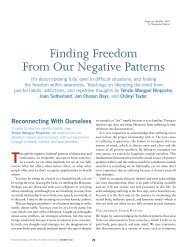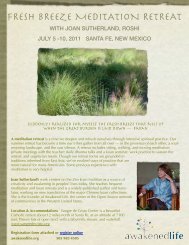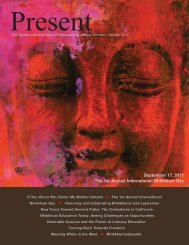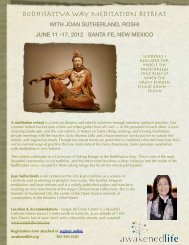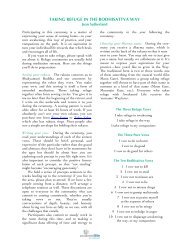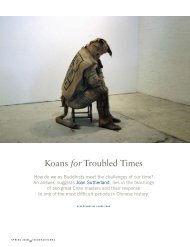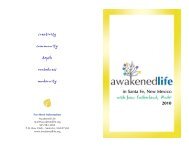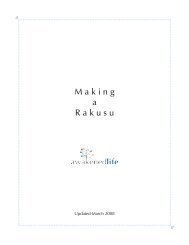Unromancing No Joan Sutherland - Awakened Life
Unromancing No Joan Sutherland - Awakened Life
Unromancing No Joan Sutherland - Awakened Life
You also want an ePaper? Increase the reach of your titles
YUMPU automatically turns print PDFs into web optimized ePapers that Google loves.
playing its own version of our game: “That’s all very<br />
well, your experience of the shining whole, but<br />
what about this? Is this it, too?”<br />
If hope remains anywhere inside you that<br />
awakening will save you from having to live your<br />
life, that illusion will now be well and truly<br />
shattered. Here is your life, demanding to be lived.<br />
Here is the next gift of the koans, provoking you to<br />
discover whether you really can integrate what<br />
you've come to know of the vastness with what<br />
you've come to see more clearly about the everyday.<br />
This can be a difficult time, but if you hold through,<br />
something genuinely transforming happens: You<br />
find that you are content to be living this human<br />
life, and you no longer need things to be different in<br />
order to be happy. This sounds rather unromantic<br />
and small, but to genuinely feel like this is to be<br />
free.<br />
Hand in hand with this is the deep desire for<br />
things to get better so that others can find their own<br />
way to happiness. In the world view of the koans, it<br />
somehow makes perfect sense to be committed to<br />
changing things for the benefit of others without<br />
needing to change them for yourself. The level at<br />
which you might do this isn’t grand: nothing about<br />
trying to convert people or invading to bring them<br />
democracy. What seems self-evidently desirable are<br />
the fundamental things that make it possible for<br />
others to get free: clean water, no bombs or<br />
landmines, intervening in global warming before<br />
people’s homes start disappearing under the waves.<br />
Once Zhaozhou asked another teacher, Touzi,<br />
how he’d describe coming back to life after a<br />
profound breakthrough, which is sometimes called<br />
a great death. Touzi replied that you can’t do it by<br />
walking about in the night, by which he meant by<br />
clinging to your breakthrough; you come back by<br />
giving yourself to the daylight. To fully realize <strong>No</strong>,<br />
you have to give yourself to the sunlit, everyday<br />
world. You have to care, to make art and babies and<br />
run for town council. You crash back into life<br />
because life, with all its complications and<br />
disappointments and heartbreak, is the ground of<br />
our awakening.<br />
As you step back into the everyday you’re not<br />
abandoned to fate and blind chance, because there<br />
are all the other koans. If you keep company with<br />
them, they’ll show you how to deepen and widen<br />
the opening that started with <strong>No</strong>. At first they show<br />
you where the light shines brightly for you and<br />
where it’s obscured, and they help the light spread<br />
to the shaded places. Then they ask you to<br />
articulate your experience as you go, which refines<br />
your understanding. And all along they’re pushing<br />
you to integrate the big view with your everyday<br />
life. Koans make sure that once you’ve been<br />
transformed you stay transformed.<br />
I can’t say I completely understand how koans<br />
like <strong>No</strong> work. I can’t say that they cause awakening<br />
in any sense that we usually mean ‘cause’. Perhaps<br />
they just keep us open, or off-balance, so that other<br />
things can act upon us, so that we’re fetchable. This<br />
week I think that their importance as a spiritual<br />
technology lies in their ability to reliably show us<br />
three aspects of awakening: the shining, eternal face<br />
whose revelation is one of the deepest graces we<br />
humans can experience; the shape-shifting face that<br />
invites us, along with everything else, to dream the<br />
world into existence; and the complicated earthly<br />
face, in whose presence we have to care about the<br />
world and exert ourselves on its behalf. And that<br />
the koans encourage our doubt, and ask us to trust<br />
our own experience, and don’t give an inch on the<br />
important things. And I do notice that if people are<br />
willing to take up a koan like <strong>No</strong> with their whole<br />
selves, they tend to get kinder and wiser and more<br />
courageous. I don’t know about happily ever after,<br />
but that sure seems like happily right here and now<br />
to me.<br />
<strong>Sutherland</strong><br />
4<br />
<strong>Unromancing</strong> <strong>No</strong>



